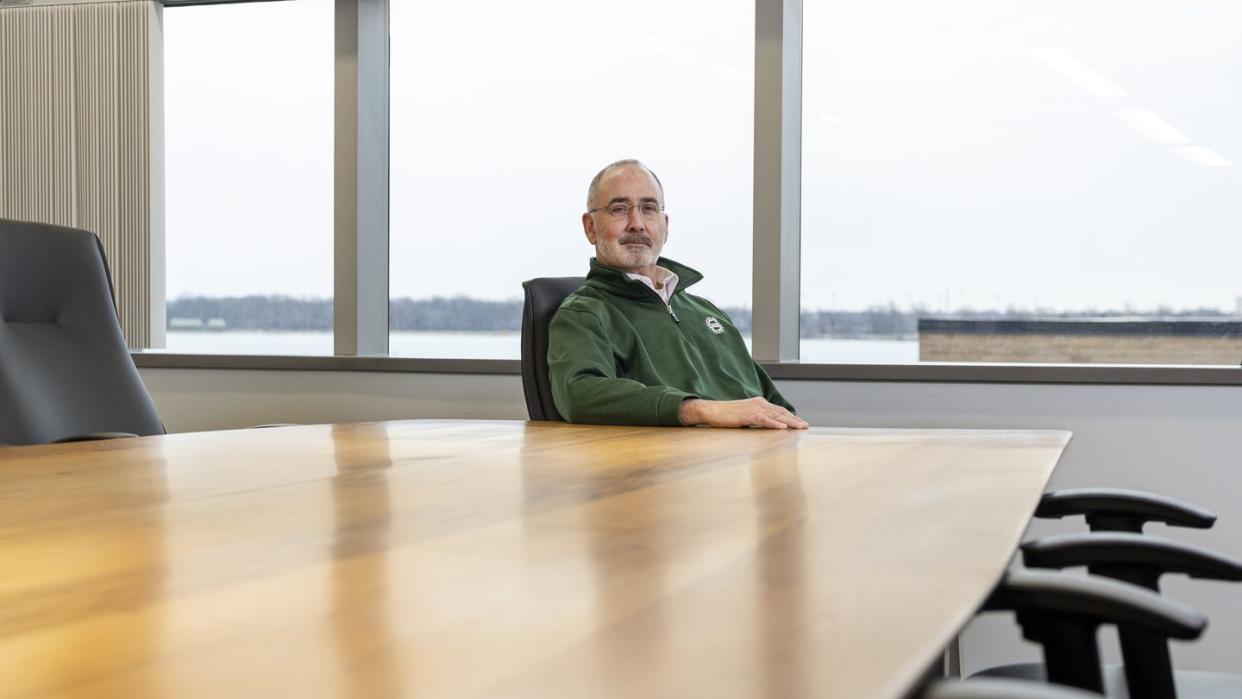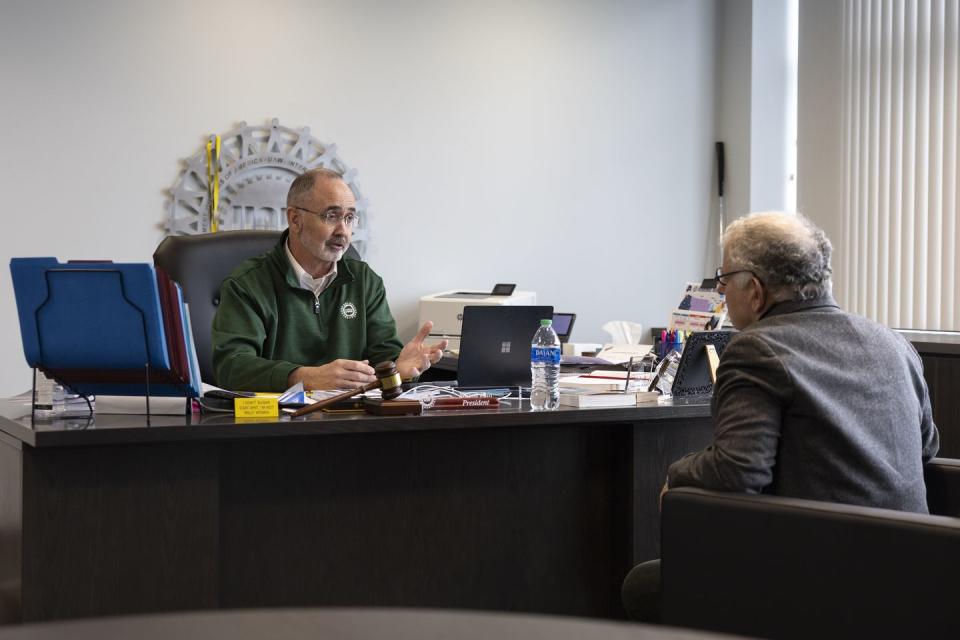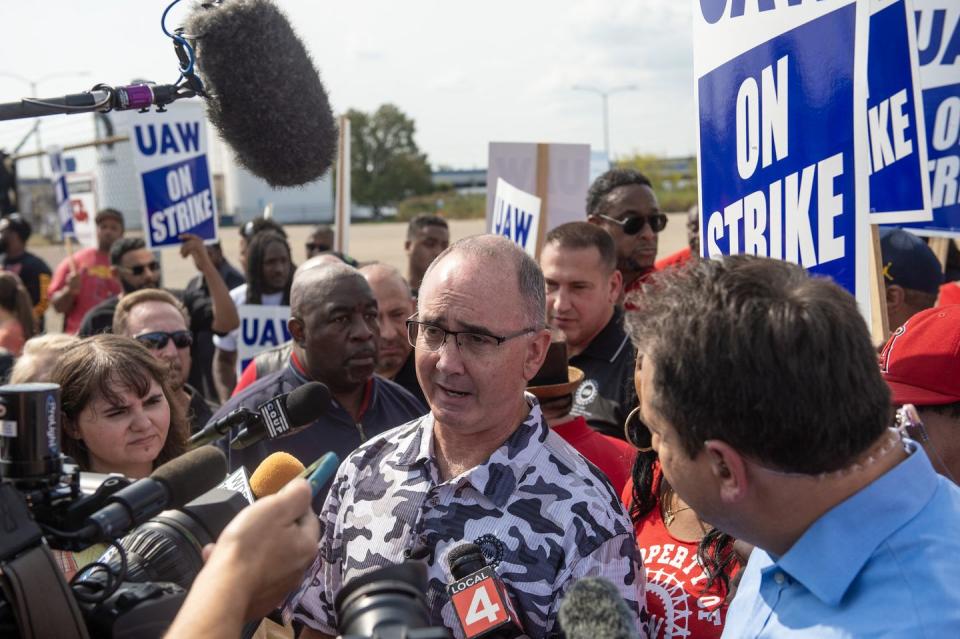UAW Leader Shawn Fain Is Bullish on the American Auto Worker

United Automobile, Aerospace and Agricultural Implement Workers of America president Shawn Fain is the UAW's most outspoken leader since Walter Reuther took the top job in 1946. An electrician by trade—and the proud owner today of a 2010 Dodge Charger ("It’s got a Hemi," he says) and a 1984 Chevrolet El Camino, handed down from his grandfather—Fain originally took a job at Chrysler's Kokomo, Indiana, factory in 1994. Becoming a union committee person, he ran against the grain of the union's national leadership, notably opposing givebacks agreed during the 2007–2009 recession.
He might have been just a bothersome but easily ignored union dissident were it not for the 2022 felony convictions of 14 UAW officials and three FCA executives for fraud and corruption, including embezzlement. After the corruption of its management was exposed, union membership voted to elect their leader directly for the first time, giving outsider Fain a fighting chance. He won an upset victory over the Caucus's preferred candidate and assumed the presidency in March 2023.
As the big American carmakers' UAW agreements drew close to their September 2023 expiration date, Fain articulated, in unusually blunt language, workers' outrage over wages that failed to keep pace with inflation and benefits dramatically inferior to those paid in previous decades, shortfalls compounded by the introduction of a "two tier" wage system that saw new hires paid less than existing employees. Givebacks remained through years of record industry profits and skyrocketing executive compensation. When the companies failed to come close to meeting the UAW's demands, a strike was declared, with the union choosing to strike all three Detroit automakers at once rather than pick a single "target" as in years past.
Stand Up Strike
Thanks to a new, young staff utilizing social media with a sophistication unseen in previous campaigns, the UAW was able to rally its membership as well as capture the sympathy of the media and the public. Further catching carmakers off guard, the union's "Stand Up Strike" strategy shut down production at individual factories, saving the union money in benefits owed versus company-wide actions. By late October, the carmakers cried uncle, signing record contracts with average wage increases of at least 25 percent over four and a half years, including a 160 percent hike for newer employees long classified as temporary. Cost-of-living adjustments to offset inflation—eliminated in previous contracts—were restored, and Stellantis agreed to reopen a factory in Belvidere, Illinois.
In the wake of the settlement, several companies, including Hyundai, Kia, Volkswagen, Toyota, Honda, and Tesla, gave their workers unsolicited raises, looking to circumvent unionization.
Recently, Jamie Kitman sat down with Fain at the UAW’s Detroit headquarters, Solidarity House. Their discussion has been edited for length and clarity.

Car and Driver: One notable thing about this negotiation was how quickly and successfully the union defined the issues. It seemed to catch carmakers flat-footed. It also seemed like management couldn't believe the tenor of the union's public statements and the public's generally supportive response. How did that happen?
Shawn Fain: Like a lot of our members, I was extremely frustrated with our leadership in the past. The corruption was one thing. But even prior to that. What they call "working together," I call "company unionism." All we witnessed out of that philosophy is losing plants, losing jobs. We watched, over 20 years, 65 factories [owned by] the Big Three disappear. "Working together," as I view it, would be when it's a win-win for everybody. It's not one-sided.
I've been in national bargaining in the past—I was a negotiator during the recession and the Chrysler bankruptcy. I saw then how the company went after everything and took advantage of a bad situation. Workers bore the brunt of all that sacrifice. Moving forward, we've sat here for over a decade, watching the Big Three make massive profits. And so it really felt like, right from the beginning, we had to set the tone and do things differently.
We ran the contract campaign to define the narrative and define the issues. In the last decade, the [Big Three] companies made a quarter-trillion dollars in profits. CEO pay went up 40 percent in the last four years. And our pay went backwards. So that was really setting the table.
Was that intended as an internal campaign or public as well?
When I ran for this position, I had to run a campaign. I didn't have the advantages that the former administration caucus people had because they were in power. They could fly all over the country on the union's dime and visit plants under the guise of union business. People like me who were running had to take vacation [time] and go stand out at plant gates and hope to catch workers coming and going. So I relied on social media to get who I was out there and to interact with members all over the country, because that was really the only way I could do it effectively. I started using Facebook Live throughout my campaign. We really were doing this as a way to communicate with our members. But it turned into a lot more because social media brought in anyone that wanted to come in. The general public was paying attention, the news media paid attention. And I think it was really effective, because when it got time to go on strike, 75 percent of Americans supported us.
That was unexpected. And so was the lack of media hostility. I guess it made me think that the management of the car companies really never had to work very hard before to get their message out.
Companies were used to having their way, saying what they wanted and getting it. I don't think they really knew how to handle leadership that wasn't operating in that mode. In the past, our leaders would stand up and beat the podium and say, "We're gonna fight, we're gonna fight, fight, fight!" And then when they got into negotiations, they'd roll over.
[In the past,] the companies were... putting their opinions out and leading public opinion about these greedy union workers and how they're going to destroy everything. And when that's all the public's hearing, it's going to create a narrative. I think it's imperative that we communicate with the media and talk about our issues. And I would use our contract campaign and our strike as a case study of how effective it can be.

The companies are already blaming your new contract for price hikes.
Over the last four years the price of vehicles went up 35 percent on average. But our wages didn't go up. Our benefits didn't get better. Nothing changed for us. The price hikes are because of two things: corporate greed and consumer price gouging. Coming out of the pandemic, they found a way to take advantage of consumers. They jacked prices way up and sold fewer vehicles but made more profits. So that's the first part of this equation—they've got to quit lying to the public and putting fear out there that if workers are paid what they're worth, it's going to kill the business. It's not.
GM did manage to afford a $10 billion share buyback and dividend hike almost exactly at the same time as they settled the contract negotiation.
They’re crying and crying about our contract. Two weeks later, they gave more in buybacks and dividends than they spent on this entire contract. Labor costs historically are only 5 to 7 percent of the total cost of an automobile. [Carmakers] could give us everything they gave us in that contract and not raise the price of cars a penny and still make massive profits. Why are they not complaining about what those dividends and buybacks cost them? They affect the bottom line more.
I really enjoyed watching [GM chair and chief executive officer] Mary Barra in an interview when the interviewer actually asked her, "You got a 40 percent pay increase over the past four years, you made $29 million last year, and your workers are asking for an increase, and why do you think it's okay for you to make what you make?" You could see her just be, like, "Um, I'm paid by the board for the value of the work I do." But it was great to see someone be asked that question, because that answer is bullshit.
It seems like the success of your drive has renewed interest in unionization among workers at non-union factories.
Workers have realized they've been getting screwed for decades, and they're fed up. This isn't because I'm a magician, or I have all this power. These workers decided they've had enough. If Volkswagen workers had Ford's [new] agreement, they would have got $23,000 profit sharing checks this year. Instead, they got zero.
The Japanese and Korean Six? We made a big deal in the Big Three contract fight that these companies made a quarter-trillion dollars in profits in the last decade. But the Japanese and Korean Six made $480 billion. The German Three made $460 billion in profits worldwide. Toyota alone made $256 billion profit in the last decade. Their profit margins are obscenely more gross than they were at the Big Three, and yet their workers get less. I truly believe we're going to see a huge shift this year. I think we're gonna win in the South.
It seems like it’s actually in the Big Three's interest for their competitors to become unionized. Yet they don't do things that are squarely in their interest. The same way they haven't vocally supported universal health care, which gives all these foreign makers with a national health care program a leg up right out of the gate.
We've told the companies this in bargaining sessions, because they always cry about health-care costs. As I told them, "We've been beating down the door for national health care. Where have you been? Why aren't you knocking on the doors in D.C. with us to push for it? You want to control your costs? Stand with us, and we'll do that. But don't cry about it on one end, and then on the other, fight everything that has to do with it."
Could it be that it's embarrassing for them to show up at the country club advocating some of these positions?
It could be embarrassing, yes. If you have misguided principles. But the thing is, if someone asked me, "What the hell, you believe in paying people a decent wage? You believe someone should have health care? You believe that they should have a secure retirement and dignity when they get too old to work?" I hate to say it and use this word, but my response to that would be "Yes, I do. Fuck off. Why don't you believe that? What's wrong with you?"
Well, I guess that's why you're not in the country club with them.
You bet.

It seems there could be a real marketing upside, following the settlement, for the U.S. automakers to say, "We're proud American companies, we pay our workers a fair wage. And here they are. They're really happy." You know, the way they used to make those Saturn ads, it made it seem like those workers had the greatest job in the world. That would also put pressure on their non-union competitors. They could take the fight right to the vociferously anti-union Tesla, à la "Why doesn't the richest—or second-richest—man in the world pay his workers a decent wage? Don't buy his cars. Buy ours."
Musk is the epitome of everything that's wrong in this world right now.
As far as the Big Three go, the irony to me is they tell us, "We support that, we want you to organize [our competitors' U.S. plants]." So, well, we tell them, "We want to organize them, but you know, it's not just our job. Get in the fight with us." They don't do anything.
EVs seem to have put the UAW—historically supportive of the environmental movement—into an awkward position, with many workers turning against electric cars, wondering if, as EV adoption spreads, they'll still have a job. The industry seems to be telling workers, "The government is forcing us to have electric cars, so we've got to ditch unions and pay less. And can you please join us fighting against electric-car mandates?" One likes to think the goals of well-paid employment and higher-mileage ICE and zero-emissions vehicles can harmonize.
We believe in having clean water and clean air. To sustain life, we have to have them. We can't stick our head in a hole and say, "It's okay for me. I'm gonna live my life, but future generations, you're screwed." That’s not acceptable. Over 50 years ago, [Reuther's successor] Leonard Woodcock talked about the internal-combustion engine and how it was poisoning the environment, and that we needed to change and find new technologies.
We still have the internal-combustion-engine work. We didn't give any of that away. But study after study has shown global warming is not a hoax. It's a reality. More severe storms and hurricanes, 70-degree temperatures in the middle of January. We have to act. But you really have to thread the needle because, obviously, it's a massive shift. But it can be a transition that works for everyone. Walter Reuther had this famous saying, "We have to master technology, not let it master us." As we have advancements in technology, it should be making life easier and better for people.
Can we talk about Trump, who actively champions business interests yet has strong appeal to large segments of the working class? The union has endorsed Biden, while criticizing some of his policies, and more harshly criticized Trump. Yet clearly some large portion of the membership feels differently.
As I tell our members, "Look, this isn't a Democrat/Republican issue. This isn't a party issue. This wasn't my opinion. Let's look at their own words and their own actions." And when we sat down and started doing that, just writing down their track records, it's a very stark contrast. One has a history of serving others and standing up for labor. For the first time in American history, a sitting U.S. president [Biden] joined workers on the picket line. Trump had that opportunity in 2019, when GM was on strike for 40 days. He never said a word about the strike. He never did a damn thing to support it.
You go back to the [2008–2009] recession. President Biden was the vice president then, they worked on a path forward for [the U.S. car business] to survive, they battled for the American worker. Trump, at the same time, was blaming the workers for everything that was wrong with these companies. Joe Biden has a lifelong history of serving others and standing with working-class people, President Trump has a lifetime history of serving himself and the billionaire class. Sure, some of our members are still going to vote for Trump. But at the end of the day, we have to put the facts out there, we have to talk to our members about that. And hope like hell we don't have another disaster for four years.
Let me shift gears for a moment. How did you come to have your beliefs?
My upbringing. I was blessed to have all four of my grandparents alive as I was growing up, and they all went through the Great Depression. I heard a lot of stories. One of my grandmothers and her siblings were left in an orphanage in Tennessee during the Depression. And that was the norm for a lot of people back then; their parents couldn't afford to take care of them. My grandparents were very poor. They left the South and moved north and were able to get jobs with the Big Three. It changed their lives. They lived the American dream because of having a union and those benefits.
Also, as I became an adult, I started reading the Bible and getting a strong faith. I pray every day when I wake up. I do a daily reading. And everything I read about it, no matter what religion someone is, whether you're Muslim or Christian or Jewish, whatever your belief is, all religion speaks to one thing, it's love of your fellow human being.
So those are things that we really have to start thinking about as humans. What do we want and where we want to be as a human race? We have to put aside all the differences and all the division tactics that the billionaire class has used over the years to keep us all fighting—over guns, race, gender, who your partner is, or border security, because some poor person's just trying to find a better life. They want to villainize people and get us fighting among one another. This way we're not focused on everything in our lives being stripped away from us, and they've done a masterful job of it in the last 40 years.
It's time we realized that for what it is, and we focus on what matters in life, and everything we do as a human race should take humanity into account as we move forward. That's got to be our model.
You Might Also Like

 Yahoo News
Yahoo News 
